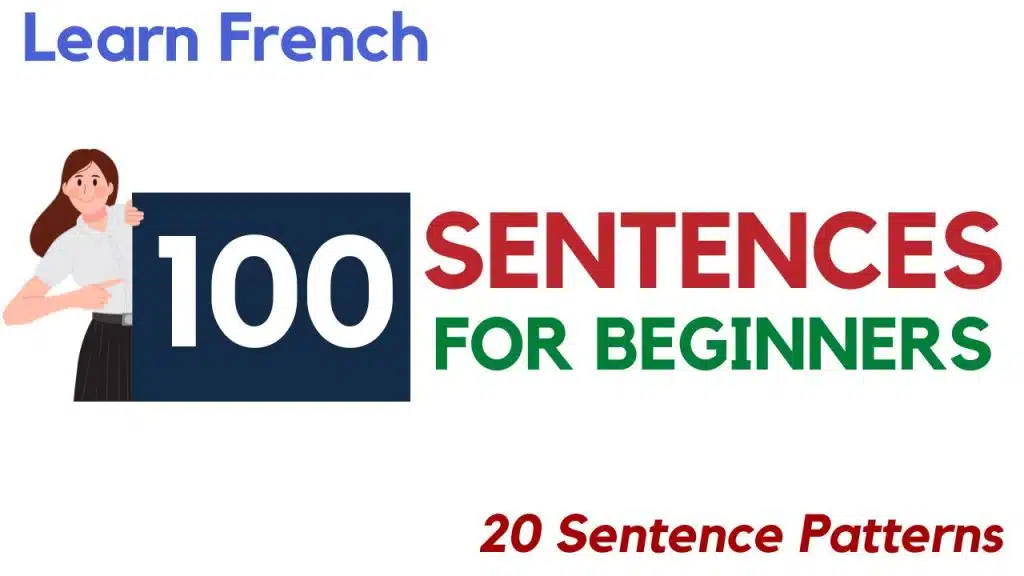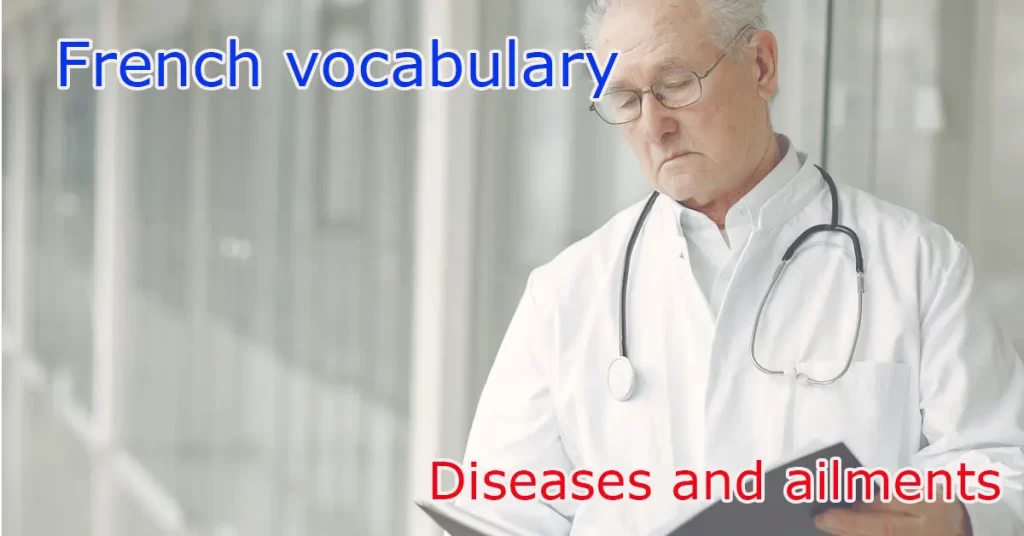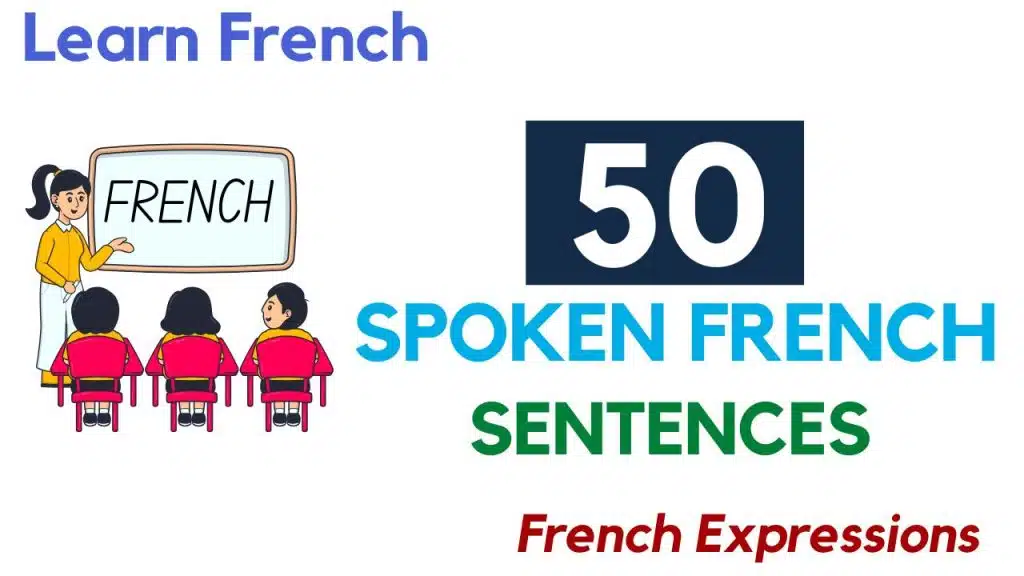French conversation – Everyday dialogues
How to speak French fluently? This is a question often asked by beginner learners. The truth is, there is no magical recipe, learning French as any other language request a certain amount of effort and regular work.
If you already started to learn French at school or with a book at home or videos on YouTube, you probably noticed that grammar plays an important role in this language, and is quite complicated.
While it is important to know French grammar, it should not slow you down to practice your listening but most importantly, your speaking.
At first, when you will speak French, you will make a lot of mistakes, especially with the gender of the words, masculine and feminine, but don’t worry, it’s better to practice and make mistakes than to be afraid to talk.
So how can you improve your French skill?
Well, listening to French songs and watching French series or movies is a good start for improving your listening skills.
Then try to repeat the lyrics of a song, for example, even if you don’t understand the meaning, it will help you with the pronunciation.
Listening to French conversation is also a good way to practice, and this is what you can do in this post.
What is the right way to learn French?
There are no general rules to learn French, everyone has his own way to memorize and learn vocabulary, grammar rules, conjugation…
Anyway, to help you in your French learning process, I prepared 10 short French conversations, that covered different daily life situations. For example, talking with a friend, with a waiter at the restaurant, with a seller at the market.
You can listen to the audio files for each conversation, one is at a slow pace and one is at a natural pace. When listening to the audio, try to follow the dialogues with the text.
This will help you to improve your listening skills. For your speaking skills, try to repeat after me, or even better, try to practice with someone, for example, if you have a French partner, French friends, or classmates learning French with you.
Below you will find 10 short French conversations, a PDF file you can download or print to practice, and a video.
The goal is to make yourself familiar with these conversations in different situations until you can automatically speak them, and not just memorize them.
If you frequently practice your listening and speaking, you will definitively see results.
1) Conversation 1: Meeting someone
Conversation at a slow pace:
Conversation at a natural pace:
Julien : Salut. (Hi.)
Lucie : Salut. (Hi.)
Julien : Comment vas-tu ?* (How are you?)
Lucie : Ça va, merci, et toi ? (I’m fine, thanks, and you?)
Julien : Ça va bien, merci. (I’m fine, thank you.)
Julien : Comment tu t’appelles ?**(What’s your name?)
Lucie : Je m’appelle Lucie et toi ? (My name is Lucie and you?)
Julien : Je m’appelle Julien (My name is Julien.)
Julien : D’où viens-tu ?***(Where are you from?)
Lucie : Je viens d’Espagne et toi ? (I’m from Spain and you?)
Julien : Je viens d’Allemagne. (I’m from Germany.)
Julien : Tu habites où ?****(Where do you live?)
Lucie : Je vis à Barcelone et toi ? (I live in Barcelona and you?)
Julien : J’habite à Berlin. (I live in Berlin.)
Julien : Tu parles anglais ? (Do you speak English?)
Lucie : Non, je parle espagnol et français. (No, I speak Spanish and French.)
Lucie : Mais, j’aimerais bien apprendre l’anglais. (But, I would like to learn English.)
Lucie : Et toi, tu parles anglais ? (And you, can you speak English?)
Julien : Oui, mais pas très bien. (Yes, but not very well.)
Julien : Je devrais pratiquer plus souvent. (I should practice more often.)
Julien : Tu es libre demain ? (Are you free tomorrow?)
Lucie : Oui, je suis libre toute la journée. (Yes, I’m free all day.)
Julien : Tu veux aller au parc avec moi ? (Do you want to go to the park with me?)
Lucie : Oui, bonne idée. (Yes, good idea.)
Lucie : Tu veux y aller vers quelle heure ? (What time do you want to go?)
Julien : Vers 14 heures, ça te va ? (Around 2 p.m., is it okay for you?)
Lucie : Oui, parfait. (Yes, perfect.)
*You can also say: Ça va ?, Comment ça va ?, Comment tu vas ? instead of Comment vas-tu ?
**You can also say: Tu t’appelles comment? (more familiar) or Comment t’appelles-tu? (formal) instead of Comment tu t’appelles ?
***You can also say: Tu viens d’où ? instead of D’où viens-tu ?
****You can also say: Tu vis où ?, Où vis-tu ? Où habites-tu ? instead of Tu habites où (more familiar) ?
2) Conversation 2 : Friends dialogue
Conversation at a slow pace:
Conversation at a natural pace:
Arnaud : Salut Martin. (Hi Martin.)
Martin : Salut Arnaud. (Hi Arnaud.)
Arnaud : Ça va ? (How are you?)
Martin : Bien, et toi ? (Good, and you?)
Arnaud : Ça va, tu viens au foot ce soir ? (I’m fine, are you playing soccer tonight?)
Martin : Ouais, c’est à quelle heure le match ? (Yes, what time is the game?)
Arnaud : On joue à 20 heures. (We play at 8pm.)
Arnaud : N’oublie pas tes crampons ? (Don’t forget your cleats?)
Martin : Oui, je les ai déjà mis dans mon sac. (Yes, I already put them in my bag.)
3) Conversation 3: Friends dialogue
Conversation at a slow pace:
Conversation at a natural pace:
Franck : Salut Pierre. (Hi Pierre.)
Pierre : Salut Franck. (Hi Franck.)
Franck : Ça va ? (How are you?)
Pierre : Ça roule, et toi ? (I’m fine, and you?)
Franck : Ça pourrait aller mieux. (Could be better.)
Pierre : Qu’est-ce qui ne va pas ? (What’s wrong?)
Franck : J’ai perdu mon portefeuille. (I lost my wallet.)
Pierre : Ah, pas de chance. (Ah, no luck.)
Franck : Ouais, je dois refaire mon permis et mes cartes de crédit. (Yeah, I have to redo my driving license and my credit cards.)
4) Conversation 4: Friends dialogue
Conversation at a slow pace:
Conversation at a natural pace:
Pascal : Salut, Jean ! Comment ça va ? (Hi, Jean! How’s it going?)
Jean : Bien, merci, et toi ? (Fine, thanks, and you?)
Pascal : Très bien. Où est-ce que tu vas ? (Just fine. Where are you off to?)
Jean : À la bibliothèque. J’ai un examen de français la semaine prochaine et je dois commencer à réviser. (To the library. I’ve got a French exam next week and need to start studying.)
Pascal : D’accord. On se retrouve tout à l’heure alors. Bonne chance ! (Alright. Well, let’s catch up later. Good luck!)
Jean : Merci. À plus tard. (Thanks. See you later.)
5) Conversation 5: At the restaurant
Conversation at a slow pace:
Conversation at a natural pace:
Serveur : Bonsoir, vous avez réservé ? (Good evening, do you have a reservation?)
Franck : Bonsoir, oui j’ai réservé une table pour deux personnes, pour 20 heures. (Good evening, yes I have booked a table for two people, for 8 pm.)
Serveur : À quel nom ? (Under what name?)
Franck : M. Klein. (Mr Klein.)
Serveur : Très bien, suivez-moi. (All right, follow me.)
Serveur : Voici votre table, je vous laisse vous installer. (Here is your table, I let you take a seat.)
Franck : Merci. (Thank you.)
Serveur : Voici les menus, désirez-vous un apéritif ? (Here are the menus, would you like a drink?)
Franck : Oui, un pastis et un verre de vin, s’il vous plaît. (Yes, a pastis and a glass of wine, please.)
Serveur : Je vous ramène ça tout de suite. (I’ll bring this back to you in a minute.)
Serveur : Voici les boissons, vous avez fait votre choix ? (Here are the drinks, have you made your choice?)
Franck : Merci, nous allons prendre une choucroute, un coq au vin, et une salade niçoise. (Thank you, we’ll have a dressed sauerkraut, a « coq au vin », and a niçoise salad.)
Serveur : Très bon choix, c’est noté. (Very good choice, it is noted.)
Learn French vocabulary at the restaurant
6) Conversation 6: At the market
Conversation at a slow pace:
Conversation at a natural pace:
Vendeur : Bonjour monsieur, que désirez-vous ? (Hello sir, what would you like?)
Client : Bonjour, il me faudrait 3 kilos de pommes s’il vous plaît. (Hello, I need 3 kilos of apples please.)
Vendeur : D’accord, ces pommes sont à 1.40€/kg, elles sont très bonnes. (Ok, these apples cost 1.40€/kg, they are very good.)
Client : Ok, je vous fais confiance, vous avez des mangues aussi ? (Ok, I trust you, do you have mangoes too?)
Vendeur : Non pas en ce moment, mais j’ai des pêches très juteuses, à seulement 1.90€/kg. (Not now, but I have some very juicy peaches, at only 1.90€/kg.)
Client : Ok, rajoutez-moi un kilo de pêches alors, et je vais aussi prendre une pastèque. (Ok, then add a kilo of peaches, and I’ll take a watermelon too.)
Vendeur : Ok, donc 3 kilos de pommes, 1 kilo de pêches et une pastèque, 7.60 € s’il vous plaît. (Ok, so 3 kilos of apples, 1 kilo of peaches and a watermelon, 7.60 € please.)
7) Conversation 7: Couple dialogue
Conversation at a slow pace:
Conversation at a natural pace:
Marie : Quelle heure est-il ? Nous allons être en retard ! (What time is it? We’re going to be late!)
Michel : Il est 19h10. Nous sommes à l’heure. Ne panique pas. (It’s 10 past seven. We’re on time. Don’t panic.)
Marie : Mais je pensais que nous devions être au restaurant à 19h30. Nous n’y arriverons jamais avec les bouchons. (But I thought we had to be at the restaurant at 7:30. We’ll never get there on time with the traffic jams.)
Michel : Bien sûr que si. L’heure de pointe est presque terminée. De toute façon, si nous sommes un peu en retard, ce n’est pas grave. (Sure we will. Rush hour is almost over. Anyway, if we are a little late, it’s alright.)
Michel : Martin et Julie seront surement déjà là-bas pour garder la table. (Martin and Julie will probably already be there to keep the table.)
Marie : Oui, c’est vrai, ils sont toujours à l’heure. (Yes true, they are always on time.)
Michel : D’ailleurs, tu peux les appeler pour savoir s’il y a encore de la place sur le parking du restaurant. (By the way, can you call them to see if there is still space in the restaurant parking lot.)
8) Conversation 8: On the phone
Conversation at a slow pace:
Conversation at a natural pace:
Eva : Allo ! (Hello!)
Luc : Salut, Eva ! C’est Luc. Ça va ? (Hi, Eva! It’s Luc. How are you?)
Eva : Ah Luc, ça fait longtemps, ça va et toi ? (Ah Luc, it’s been a while, how are you?)
Luc : Ça va. Ça te dit un ciné ce soir ? (I’m fine. Do you want to see a movie tonight?)
Eva : Ça dépend, à quelle heure est le film ? Je termine le boulot à 18h30. (It depends, what time is the movie? I get off work at 6:30.)
Luc : 20h30, je peux passer te récupérer à ton travail, et on peut manger ensemble avant le film, si tu veux ? (8:30 p.m., I can pick you up from work, and we can eat together before the movie, if you want?)
Eva : Ok parfait, on fait comme ça, tu veux voir quel film ? (Ok great, let’s do it this way, what movie do you want to watch?)
Luc : Le dernier Tarantino, il a l’air bien. (The latest Tarantino, it looks good.)
Eva : Ça tombe bien, je voulais le voir. La bande-annonce est mortelle. (That’s good, I wanted to see it. The movie trailer is awesome.)
Luc : À tout à l’heure, tchao ! (See you later, bye!)
Eva : À plus, bisous. (See you, kisses)
9) Conversation 9: At the doctor
Conversation at a slow pace:
Conversation at a natural pace:
Thomas : Bonjour docteur ! (Hello doctor!)
Docteur : Bonjour Thomas, qu’est-ce qui ne va pas ? (Hello Thomas, what’s wrong?)
Thomas : Je ne me sens pas bien depuis deux jours, j’ai mal au ventre et je n’ai plus d’appétit. (I have not been feeling well for two days, my stomach hurts and I have no appetite.)
Docteur : Allongez-vous, je vais vous examiner. (Lie down, I will examine you.)
Docteur : Vous avez mal, quand j’appuie ici ? Does it hurt, when I press here?)
Thomas : Oui, c’est douloureux. (Yes, it’s painful.)
Docteur : Vous avez une indigestion. Vous avez beaucoup mangé ces derniers jours ? (You have an indigestion. Have you been eating a lot in the last few days?)
Thomas : Oui, du chocolat, avant-hier. (Yes, chocolate, two days ago.)
Docteur : Je vais vous prescrire un médicament, vous irez mieux très vite. (I will prescribe you a medicine, you will feel better very quickly.)
Thomas : Merci beaucoup docteur. Au revoir. (Thank you very much doctor. Goodbye.)
Docteur : Au revoir Thomas, et reposez-vous bien. (Goodbye Thomas, and rest well.)
Learn French vocabulary about diseases and ailments
10) Conversation 10: Asking direction
Conversation at a slow pace:
Conversation at a natural pace:
Tommy : Excusez-moi. Je cherche la poste. Pouvez-vous m’aider ? (Excuse me. I’m looking for the post office. Can you help me?)
Passant : Oui bien sûr. Continuez tout droit pendant environ 100 mètres, puis tournez à gauche. (Yes, of course. Continue straight for about 100 meters, then turn left.)
Passant : Ensuite, marchez encore une trentaine de mètres, et vous tomberez dessus. Vous ne pouvez pas la louper. (Then walk another 30 meters or so, and you’ll come across it. You can’t miss it.)
Tommy : Merci beaucoup, bonne journée. (Thanks a lot, have a nice day.)
Passant : De rien, bonne journée. (You’re welcome, have a nice day.)
Here, you can download the French conversation in PDF format
You can also watch the 10 short French conversations in this video :
We hope this lesson was helpful for you, if you have any questions, please leave a comment.



